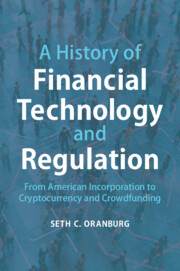 A History of Financial Technology and Regulation
A History of Financial Technology and Regulation Book contents
- A History of Financial Technology and Regulation
- A History of Financial Technology and Regulation
- Copyright page
- Dedication
- Contents
- Figures
- Acknowledgments
- Introduction
- The First Era
- The Second Era
- The Third Era
- 7 The Dot-Com Bubble
- 8 Social Media Activism
- 9 Cryptographic Theory and Decentralized Finance
- 10 Cryptocurrency Regulation
- 11 Crowdfunding
- Conclusion
- Index
- References
11 - Crowdfunding
from The Third Era
Published online by Cambridge University Press: 24 March 2022
- A History of Financial Technology and Regulation
- A History of Financial Technology and Regulation
- Copyright page
- Dedication
- Contents
- Figures
- Acknowledgments
- Introduction
- The First Era
- The Second Era
- The Third Era
- 7 The Dot-Com Bubble
- 8 Social Media Activism
- 9 Cryptographic Theory and Decentralized Finance
- 10 Cryptocurrency Regulation
- 11 Crowdfunding
- Conclusion
- Index
- References
Summary
The last Chapter explores crowdfunding, a method of raising money from a large number of people via the internet. Crowdfunding is a new financial tool that allows ordinary investors to get in on the ground floor of startup investing. Crowdfunding solves several problems that are common in financial markets by capitalizing on the wisdom of the crowd by sharing information freely and leveraging online reputation. Equity crowdfunding is now a legitimate means to raise capital under the JOBS Act. However, this Chapter discusses how excessive regulations, such as the income threshold requirement, the inability to resell illiquid securities, and unrealistically low funding limits, hamper the most promising features of equity crowdfunding. Therefore, regulators must proactively design legislation that harnesses the benefits while mitigating costs, and further promote the attractiveness of open, public, and non-secretive markets.
- Type
- Chapter
- Information
- A History of Financial Technology and RegulationFrom American Incorporation to Cryptocurrency and Crowdfunding, pp. 153 - 173Publisher: Cambridge University PressPrint publication year: 2022
